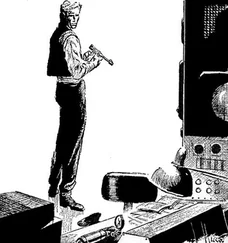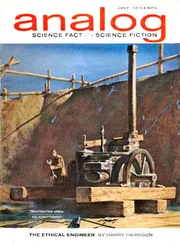Harry Harrison - The Turing Option
Здесь есть возможность читать онлайн «Harry Harrison - The Turing Option» весь текст электронной книги совершенно бесплатно (целиком полную версию без сокращений). В некоторых случаях можно слушать аудио, скачать через торрент в формате fb2 и присутствует краткое содержание. Год выпуска: 1992, ISBN: 1992, Издательство: Viking, Жанр: Фантастика и фэнтези, на английском языке. Описание произведения, (предисловие) а так же отзывы посетителей доступны на портале библиотеки ЛибКат.
- Название:The Turing Option
- Автор:
- Издательство:Viking
- Жанр:
- Год:1992
- ISBN:978-0-670-84528-6
- Рейтинг книги:3 / 5. Голосов: 1
-
Избранное:Добавить в избранное
- Отзывы:
-
Ваша оценка:
- 60
- 1
- 2
- 3
- 4
- 5
The Turing Option: краткое содержание, описание и аннотация
Предлагаем к чтению аннотацию, описание, краткое содержание или предисловие (зависит от того, что написал сам автор книги «The Turing Option»). Если вы не нашли необходимую информацию о книге — напишите в комментариях, мы постараемся отыскать её.
The Turing Option — читать онлайн бесплатно полную книгу (весь текст) целиком
Ниже представлен текст книги, разбитый по страницам. Система сохранения места последней прочитанной страницы, позволяет с удобством читать онлайн бесплатно книгу «The Turing Option», без необходимости каждый раз заново искать на чём Вы остановились. Поставьте закладку, и сможете в любой момент перейти на страницу, на которой закончили чтение.
Интервал:
Закладка:
“You have succeeded. The patient will talk…”
“I will have no interruptions. From anyone. When I have finished my description of what has been done and what my prognosis is I will then answer any questions.”
Snaresbrook was silent for a moment. So was General Schorcht, radiating pure hatred. She smiled demurely, then went on.
“I may have failed completely. If I have, that is the end of it. I’ll not open his head again. I want to tell you strongly that there is always a chance of this. Everything I have done is still experimental — which is why I make no promises. But I will tell you what I hope will happen. If I have succeeded the patient will regain consciousness and should be able to talk. But I doubt if I will be talking to the man who was shot. He will not remember any of his life as an adult. If my procedures succeed, if he regains consciousness, it will be as a child.”
She ignored the murmur of dismay, waited until it died down before she continued.
“If this is what happens I will be very pleased. It will mean that the procedure has succeeded. That will be the first step. If it goes as planned I must then proceed with additional input and communication in the hopes that his memories will be brought forward to the period in time when the assault occurred. Questions?”
Benicoff got in first with the question so vital to him. “You hope to bring his memory right up to the day the assault occurred?”
“That may indeed be possible.”
“Will he remember what happened? Will he tell us who did it?”
“No, that is impossible.” Snaresbrook waited until the reactions had died away before she spoke again. “You must understand that there are two kinds of memory, long-term and short-term. Long-term memories last for years, usually for an entire lifetime. Short-term is what happens to us in real time, details of a conversation we might be hearing, a book that we are reading. Most short-term memories simply fade away in a few seconds, or minutes. But some parts of short-term memories, if they are important enough, will eventually become long-term memory. But only after about a half an hour. It takes the brain that much time to process and store it. This is demonstrated in what is known as posttrauma shock. Victims of car accidents, for instance, can remember nothing of the accident if they were rendered unconscious at the time. Their short-term memory never became long-term memory.”
General Schorcht’s cold voice cut through the other voices and questions.
“If there is no chance of your succeeding in this dubious medical procedure why did you undertake it in the first place?”
Erin Snaresbrook had her fill of insults. Her cheeks flushed and she started to rise. Benicoff was on his feet first.
“May I remind everyone here that I am in charge of this ongoing investigation. At great personal sacrifice Dr. Snaresbrook volunteered to help us. Her work is all that we have. Though there have been deaths already, and the patient may very well die as well, it is the investigation that is of paramount importance. Brian Delaney may not reveal the killers — but he can show us how to build his artificial intelligence, which is what this entire matter is all about.”
He sat down slowly and turned in his chair. “Dr. Snaresbrook, will you be kind enough to tell us what procedures are still to come?”
“Yes, of course. As you know I have left a number of surgical implants within the patient’s brain. They consist of various kinds of computers connected by microscopic terminals to the brain’s nerve fibers. Controlled measures of chemicals can be released through these. By combining this with a carefully monitored variety of stimuli, I hope he will soon learn how to access more of his later but now inaccessible memories. When these are integrated he should have a functional mind once again.
“There may be gaps — but he will not be aware of them. What I hope he will be aware of and remember is all of the work he did in developing his AI. So that he can rebuild it and make it function.
“I will of course use more than chemicals. I have also implanted computer film chips that will interface directly with nerve endings. On these chips are embryonic brain cells that can be induced to grow in various ways. They can be kept dormant as long as I want, waiting for an opportunity to make the correct connections. When they are activated each one will be tested. The ones that end up wrong will be disconnected so that only the successful will remain active. This can all be done by opening microscopic chemical holes implanted in the chips. Either a connection will be made — or a tiny package of neurotoxins will destroy the cell.”
“I have a question,” one of the men said.
“Of course.”
“Are you telling us that you are installing a machine-mind interface inside that boy’s skull?”
“I am — and I don’t know why you sound so shocked. This kind of thing has been going on for many years now. Why, even in the last century we were hooking up neural connections in the ear to cure deafness. Many times in recent years we have been able to use nerve impulses from the spinal cord to activate prosthetic legs. Connecting to the brain itself was a logical next step.”
“When will we be able to talk to Mr. Delaney?” Schorcht snapped.
“Perhaps never.” Dr. Snaresbrook stood up. “You have my report. Make of it what you will. I am doing my very best, with still-experimental techniques, to rebuild that shattered mind. Trust me. If I succeed you will be the first to know.”
She ignored the voices, the questions, turned and left the room.
10
September 17, 2023
Brian came slowly back to consciousness, rising up from a deep and dreamless sleep. Awareness slipped away, came again, sank into darkness again. This happened a number of times over a period of days and each time he remembered nothing of the previous approach to consciousness.
Then, for the first time, he did remain on the borderline of full awareness. Though his eyes were still shut he gradually began to realize that he was awake. And dreadfully tired. Why was that? He did not know, did not really care. Cared about nothing.
“Brian…”
The voice came from a very great distance. At the edge of audibility. At first it was just there, something to be experienced and not considered. But it kept repeating. Brian, then Brian again.
Why? The word rolled around and around in his thoughts until memory returned. That was his name. He was Brian. Someone was speaking his name. His name was Brian and someone was speaking his name aloud.
“Brian — open your eyes, Brian.”
Eyes. His eyes. His eyes were shut. Open your eyes, Brian.
Light. Strong light. Then soothing darkness once again.
“Open your eyes, Brian. Do not keep your eyes closed. Look at me, Brian.”
Glare again, blink, shut, open. Light. Vagueness. Something floating before him.
“That’s very good, Brian. Can you see me? If you can, say yes.”
This was not an easy thing to do. But it was a command. See. Light and something. See me. See the me. See me say yes. What was seeing? Was he seeing? What was he seeing?
It was hard, but each time he thought about it the process became easier. See — with the eyes. See a thing. What thing? The blur. What was a blur? A blur was a thing. What land of a thing? And what was a thing?
Face.
Face! Yes, a face! He was very happy to discover that. He saw that this was a face. A face had two eyes, a nose, a mouth, hair. What about the hair?
The hair was gray.
Very good, Brian. He was doing so well. He felt very happy.
Читать дальшеИнтервал:
Закладка:
Похожие книги на «The Turing Option»
Представляем Вашему вниманию похожие книги на «The Turing Option» списком для выбора. Мы отобрали схожую по названию и смыслу литературу в надежде предоставить читателям больше вариантов отыскать новые, интересные, ещё непрочитанные произведения.
Обсуждение, отзывы о книге «The Turing Option» и просто собственные мнения читателей. Оставьте ваши комментарии, напишите, что Вы думаете о произведении, его смысле или главных героях. Укажите что конкретно понравилось, а что нет, и почему Вы так считаете.










